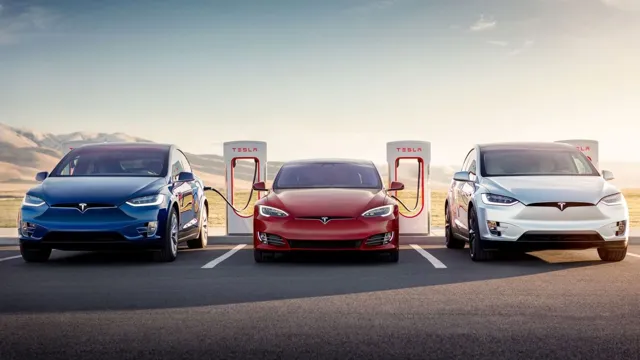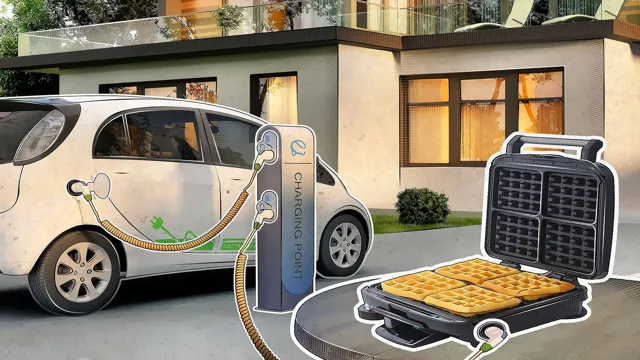The Complete Step-by-Step Ultimate Guide to Buying Your Dream Electric Car: The Ultimate Buyer’s Handbook for Sustainable Driving
Thinking of buying an electric car but feeling overwhelmed by the vast array of options available? You’re not alone! With the rise of electric vehicles, the market has become a confusing landscape of jargon and technical specifications that can leave anyone feeling lost. But fear not, we’ve got you covered with “The Ultimate Guide to Buying an Electric Car.” In this guide, we’ll walk you through everything you need to know before making your electric car purchase.
From understanding the different types of electric cars available to figuring out what charging options are best suited for your lifestyle, we’ve got you covered. We’ll also take a look at the various pros and cons of going electric and explore some frequently asked questions around electric cars. So why go electric? Beyond being more environmentally friendly, electric cars offer many benefits, including reduced fuel costs, smoother driving experiences, and access to carpool lanes.
However, it’s essential to find the right electric car that fits your lifestyle and needs. Think of buying an electric car as shifting from owning a petrol car to owning a phone. Just as you would research and compare phones before making a purchase, getting the right electric car requires research and careful consideration.
With “The Ultimate Guide to Buying an Electric Car,” we hope to help alleviate the confusion and provide you with the knowledge needed to make a well-informed decision.
Why Go Electric?
If you’re considering buying an electric car, you might be wondering why you should make the switch. There are many reasons why electric vehicles (EVs) are becoming more popular. First and foremost, they’re better for the environment.
EVs produce zero emissions, which means they don’t contribute to air pollution or climate change. Additionally, EVs are generally more efficient than gasoline-powered cars, which means they can save you money in the long run. Maintenance costs are also typically lower for EVs since they have fewer moving parts than traditional cars.
Plus, with a growing network of charging stations, it’s easier than ever to keep your EV charged and ready to go. So not only do EVs help you save money and reduce your environmental impact, but they’re also a practical and convenient choice for everyday transportation.
Advantages of Electric Cars
Electric cars have been becoming more popular over the years, and for good reason. One of the biggest advantages of electric cars is their eco-friendliness. Unlike traditional gasoline-powered cars, they don’t emit harmful pollutants into the atmosphere, which reduces air pollution and helps combat climate change.
Additionally, they require less maintenance since they have fewer moving parts, resulting in longer lifespans, lower repair costs, and less frequent oil changes. Moreover, they’re quiet and smooth to drive, providing a comfortable and stress-free experience. Electric cars also have lower fuel costs since they require charging rather than gasoline, which can help owners save money in the long run.
With the increasing demand for sustainable transportation, it’s no wonder that electric cars have become a top choice for many environmentally-conscious individuals.

Cost Savings
Cost Savings, Electric Vehicles, Environmental Benefits Are you considering switching to an electric vehicle? One of the biggest reasons for making the switch is the cost savings. Electric vehicles are generally cheaper to operate and maintain than traditional gas-powered vehicles. They have fewer moving parts which means less wear and tear, and they require less frequent maintenance.
Also, charging an electric vehicle is often cheaper per mile than buying gasoline. Electric vehicles also have a longer lifespan than traditional vehicles, saving you even more money in the long run. But the benefits of electric vehicles don’t stop at cost savings.
They have a positive impact on the environment as well. Electric vehicles produce lower emissions than gas-powered vehicles, reducing air pollution and helping to combat climate change. They also reduce our dependence on foreign oil, contributing to energy independence.
So, why go electric? Not only will you enjoy the cost savings and environmental benefits, but you’ll also be driving a quiet and smooth vehicle that delivers instant torque and acceleration. And with more and more electric vehicle options hitting the market every year, there’s never been a better time to make the switch. Make the smart choice for your wallet and the planet – go electric.
Choosing the Right Electric Car
Welcome to the ultimate guide to buying an electric car! Choosing the right electric car can be overwhelming with so many options available in the market. However, there are a few key factors to consider before making your purchase. First, determine your budget and set a realistic expectation for what you can afford.
Next, consider the driving range of the electric car and if it suits your daily needs, such as commuting, or longer trips. Additionally, take into account the charging infrastructure in your area and the type of charger needed for the specific make and model. Safety features and warranty options should also be considered, as well as the overall design and comfort of the car.
Finally, read reviews and do research on the reliability of the electric car brand you are considering. By carefully considering these factors and doing your research, you’ll be able to find the perfect electric car for you and your lifestyle.
Types of Electric Cars Available
When it comes to choosing the right electric car, there are a variety of options available to suit every lifestyle and budget. One type of electric car is the battery electric vehicle (BEV), which relies entirely on its battery for power and can drive for up to 200 miles on a single charge. Another option is the plug-in hybrid electric vehicle (PHEV), which combines electric and gasoline power to extend its driving range.
Hybrid electric vehicles (HEVs) also exist, which use gasoline and electric power to improve fuel efficiency rather than being purely electric. And for those who want to make a statement, there are luxury electric vehicles like Tesla, which combine cutting-edge technology with high-end features. Ultimately, the type of electric car you choose will depend on your lifestyle, budget, and priorities, so it’s important to do your research and consider your options carefully.
Factors to Consider When Choosing an Electric Car
When deciding to switch to electric vehicles, there are several factors to consider to ensure that you choose the right one that suits your lifestyle. First, think about the driving range of the car, which is how far the vehicle can go on a single charge. If you have a long commute or often take road trips, you’ll want to look for a car with a larger driving range.
Additionally, consider the battery size and charging time. A larger battery size means a longer driving range, but also a longer charging time. It’s also essential to examine the available charging infrastructure in your area to ensure that you can charge your car quickly and conveniently.
Other aspects to consider include car size, safety features, and overall cost of ownership. Ultimately, the best electric car for you will depend on your driving needs and preferences.
Charging Your Electric Car
When it comes to owning an electric car, one question always stands out: how do you charge it? Charging an electric car is not a complicated process, but it does require some adjustments to your routine. One option is to charge your car at home using a wall-mounted charger. These chargers are similar in size and appearance to a standard outlet, but they deliver higher voltage and current to your car, resulting in a faster rate of charging.
You can also use public charging stations, which are becoming more widespread and accessible, to charge on the go. However, it’s always important to check the charging rates and network memberships before you go on a long trip to make sure you have access to the charging infrastructure you need. Overall, while charging an electric car may require some forethought, it’s an easy adjustment to make for the benefits of cleaner, more sustainable transportation.
So, if you’re thinking about buying an electric car and want to know everything there is to know, remember that the ultimate guide to buying an electric car should also include how to charge it.
Types of Charging Stations
Charging your electric car is essential to keep it running, and there are different types of charging stations available for your convenience. The most common types of charging stations are Level 1, Level 2, and DC fast charging. Level 1 chargers can be plugged into any standard 120-volt household outlet and take around 8-12 hours to fully charge your electric car.
Level 2 chargers are typically found in public and private charging stations and require a dedicated 240-volt circuit, but they can charge your vehicle in 4-6 hours. DC fast charging is the quickest way to charge your electric vehicle, often found in public charging stations, and can charge your car to 80% in just 30 minutes. Knowing the different types of charging stations available can help you plan your charging strategy and maximize your electric car’s potential.
Charging Times and Range
When it comes to charging your electric car, there are a few things to keep in mind. Firstly, you’ll need to take into account the battery’s range, which is the distance the car can travel on a single charge. The charging time will depend on the capacity of your battery and the type of charger you are using.
For example, a fast charger can bring your car up to an 80% charge in under an hour, while a slow domestic charger may take several hours. It’s also worth noting that there are different types of charging connectors for different makes and models of electric cars, so make sure you have the right one before you start. Many public charging stations have a pay-as-you-go system, while some electric vehicles can be charged at home using a regular power socket.
It’s always a good idea to plan ahead and research charging options for the route you’ll be taking before embarking on a long journey.
Buying or Leasing an Electric Car
The ultimate guide to buying an electric car can be a daunting task, but it doesn’t have to be. There are many factors to consider when making the decision to buy or lease an electric car. One of the main considerations is the cost.
While the initial investment may be higher than a traditional gasoline-powered car, the long-term cost savings in fuel and maintenance can make up for it. It’s also important to research the range and charging capabilities of the car, as well as any available government incentives or tax credits. Leasing an electric car can be a good option for those who want to test the waters without committing to a long-term purchase.
However, buying a new or used electric car can also come with the added benefit of owning a vehicle that produces zero emissions and is better for the environment. Ultimately, the decision to buy or lease an electric car comes down to individual lifestyle and budget.
Pros and Cons of Buying
When it comes to buying or leasing an electric car, there are both pros and cons to consider. Buying an electric car means you’ll own the vehicle outright, and you won’t have to worry about mileage restrictions or potential fees for wear and tear. Plus, you’ll have the ability to customize your car to your heart’s content.
However, the upfront cost can be quite steep, and you’ll be responsible for maintenance and repairs, which can also add up over time. Leasing, on the other hand, may be a more budget-friendly option, with lower monthly payments and the ability to upgrade to the latest model every few years. However, you’ll be limited in terms of customization options, and you’ll have to watch your mileage to avoid additional fees.
Ultimately, the decision to buy or lease will depend on your financial situation, driving habits, and personal preferences.
Pros and Cons of Leasing
When it comes to purchasing an electric car, one major decision to make is whether to buy or lease. Leasing allows for lower monthly payments and the ability to upgrade to a newer model at the end of the lease term. Additionally, some leases include maintenance and repairs, making it more budget-friendly for those who don’t want to worry about unexpected costs.
However, leasing also comes with its downsides. There are mileage restrictions, excess wear and tear fees, and no equity built up in the vehicle. On the other hand, purchasing an electric car means higher monthly payments but the benefit of ownership and equity in the vehicle.
It also allows for freedom in terms of mileage and customization without the fear of extra fees. Ultimately, the decision between buying or leasing comes down to personal preference and factors such as budget and driving habits.
Maintaining Your Electric Car
Once you’ve made the decision to purchase an electric car, the next step is to ensure you’re maintaining it properly so that it runs smoothly and efficiently. One of the most important things to keep in mind is to keep the battery charged. This means charging it overnight or whenever it’s low to ensure it has enough power to get you where you need to go.
Additionally, you’ll want to schedule routine maintenance checks with a certified technician to keep everything running in top shape. This might include checking and replacing fluids, examining the brakes, and keeping the tires properly inflated. By following these simple steps, you’ll be able to enjoy the many benefits of owning an electric car for years to come.
Routine Maintenance
Maintaining an electric car may seem daunting, but routine maintenance is actually quite simple. One of the most important things to keep in mind is to regularly check the tires and the brakes. Electric cars are heavier due to their batteries, which means that the tires and brakes undergo more wear and tear.
Checking these components will help ensure safety while driving. Additionally, it’s essential to keep the charging system in check. Make sure to follow the manufacturer’s instructions when charging the battery, and avoid overcharging it as this could lead to issues down the road.
Keeping the battery in good condition will help extend its life as well. Regularly cleaning the car, both the interior and exterior, will also keep it in good shape. Lastly, it’s important to have regular inspections and tune-ups done by a professional to ensure everything is running smoothly.
Remember, routine maintenance will not only keep your electric car running well but will also save you money in the long run.
Battery Maintenance
Battery maintenance is crucial for electric car owners to ensure their vehicles are running efficiently and have a long lifespan. Keeping your battery in good condition requires routine checks and proper handling. It’s essential to regularly charge your battery, preferably before it reaches 20% of its charge.
Overcharging or storing a battery with a low charge can cause damage to the cells. It’s also recommended to keep your battery at a moderate temperature, avoiding very hot or cold environments as this can affect its performance. Just like how you need to maintain your body with a balanced diet and exercise, caring for your electric car’s battery ensures reliable and efficient performance.
So if you’re an electric car owner, make sure to give your battery the TLC it deserves to keep your vehicle running smoothly for years to come.
Conclusion
In conclusion, buying an electric car is more than just a green trend or a stylish statement. It’s a practical and responsible decision that benefits both the environment and your wallet in the long run. With the right research, planning, and budgeting, you can easily find an EV that fits your lifestyle and needs, whether it’s a compact city car, a family SUV, or a performance sports car.
So, don’t be afraid to plug in and drive away into a more sustainable and exciting future!”
FAQs
What are the benefits of buying an electric car?
Electric cars have lower fuel and maintenance costs, emit fewer emissions, and offer a smoother driving experience.
How do I know if an electric car is suitable for me?
Consider your driving habits, lifestyle, and access to charging infrastructure. You can also test drive electric cars to get a feel for the driving experience.
How much does it cost to charge an electric car?
The cost of charging an electric car varies depending on your electricity rates and the size of the car’s battery. On average, it can cost anywhere from $5 to $15 to fully charge an electric car.
How far can electric cars travel on a single charge?
The range of electric cars varies depending on the make and model, but most can travel between 100 to 300 miles on a single charge. It’s important to consider your daily driving needs when choosing an electric car with the appropriate range.
How long does it take to charge an electric car?
The charging time of an electric car depends on the battery size and charging speed. Most electric cars can be charged overnight using a 240-volt Level 2 charger, which takes about 8-10 hours. Fast chargers can charge a car up to 80% in 30 minutes.






